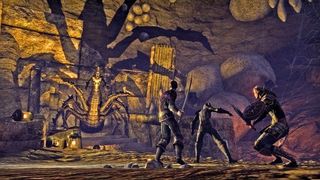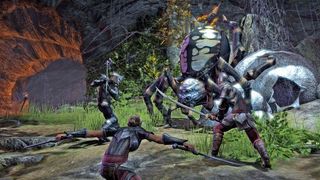The Elder Scrolls Online hands-on: six levels of combat, crafting and exploration

Like World of Warcraft: Mists of Pandaria, The Elder Scrolls Online uses phasing to subtly change each zone to reflect the player's actions. Depending on the choices you make the NPCs you see – even the enemies you fight – may be different to those of other players. While this design decision somewhat punctures the sense that everyone shares the same world, its execution is impressive in the way that a good magic trick is impressive. Playing the game, I was aware of how it was doing what it was doing, but only rarely was I fully aware what it was doing. Briefly grouped with another player, for example, I noticed that he was accompanied by an anonymous mercenary. I was travelling with an important named character that we both must have met. Then I realised: that mercenary was the same character, but the game presented him differently to me to preserve the sense that my experience was unique. It's an act of deception, but I prefer it to seeing dozens of identical twins running around, Old Republic-style.
“The phasing is very local,” Konkle says. “It's not hammering you in the face. You can play with a group and not be aware certain things are going on that are necessary in MMOs.”
"I was particularly impressed by The Elder Scrolls Online's character progression and crafting systems."
At the beginning of my time with the game, Firor explained that Zenimax Online set out to make an RPG first and an MMO second – and as overly neat as that claim sounds, there are areas where it holds up to scrutiny. I was particularly impressed by The Elder Scrolls Online's character progression and crafting systems, both of which have a shot at improving on what the Elder Scrolls games have achieved previously.
Levelling up earns you points to invest in your health, stamina or magicka pools, and a single skill point to invest in an active or passive ability in any of a number of skill lines. You start with around 15 – one for your race, three for your class, one for each type of weapon in the game, and one for each of light, medium and heavy armour. Bonuses are varied but consistent – medium armour, for example, is for stealth, while light is geared towards magic and heavy towards defence. There are no restrictions: if you want to deck your mage out in heavy armour and give them a lot of defensive perks, that's up to you. Your class is just an additional set of skill lines intended to diversify characters in the early game.

“I strongly feel that when you start to play a game you have a role in your mind that you want to do,” Firor says. “Having four classes gives you the ability to at least start out on a path.”
As you progress you'll pick up additional skill lines, including exclusive sets of abilities for members of the Fighters' Guild, Mages' Guild, vampires, werewolves, PvP players and more. The Dark Brotherhood and Thieves' Guild won't be in the game at launch, but these will also have their own skill lines in time. The strength of the skill system is how modular it is: there are plenty of hooks for Zenimax Online to expand it post-release, and given that each player has access to a finite pool of points it's easier to keep balanced.
There are five crafting professions: armoursmith, weaponsmith, enchanter, alchemist and provisioner (or 'cook'). It's possible to dabble in all five but only master one, and whatever you want to make will require experimentation akin to Skyrim's alchemy system. Ingredients gathered in the wild – through mining, exploration and hunting – each have four hidden properties that can be applied to items, and these unlock as you reverse engineer looted equipment and skill-up in your chosen craft. You can then use additives to customise the goods you produce: adding elemental damage to an axe, for example, or stamina regeneration to a healing potion.
The biggest gaming news, reviews and hardware deals
Keep up to date with the most important stories and the best deals, as picked by the PC Gamer team.
"Each faction clashes over fortresses in Molag Bal-controlled Cyrodiil."
Crafting and the economy will be closely tied to PvP, where each faction clashes over fortresses in Molag Bal-controlled Cyrodiil. You'll need craftsmen to upgrade your rams and trebuchets and to contribute towards repairing walls after a siege. Owning multiple adjacent keeps establishes a transport network enabling players to fast-travel to the front line, but territory can be conquered in any order, and the devs expect behind-the-lines guerrilla action to be a key precursor to a major offensive. The game itself won't have shards – all players will occupy instances on a single server – but players and guilds will be bound to particular 'campaigns' for PvP, so the faction war will exist in different states for different people. It'll be possible to guest in your friends' campaigns, however.

Having three factions yields serious benefits for PvP on this scale: it prevents one side from ever becoming truly dominant, and even underpopulated alliances can act as powerful wildcards in the broader conflict. The reason it's no longer common in MMOs is simple: creating three lots of content for a single game is a tall order when the average player will see, at most, a third of it. The Elder Scrolls Online's solution to this problem is clever: they've found a way for everyone to see everything.
Your quest to reclaim your soul from Molag Bal will take place in the territories of your chosen faction and lead you to level 50. Then, you'll be asked to choose a second faction to play through in what amounts to 'new game plus' mode. You'll go through previously-inaccessible zones whose difficulty and loot has been enhanced for a top-tier player. When you've finished, you pick your third and final faction and play through that. You'll still only be able to group and socialise with people from your own faction, but no content is locked off – so you can create a Khajiit without fearing that you'll never get to explore Morrowind.
Creating a stable and fair MMO means sacrificing parts of the Elder Scrolls formula that will alienate certain fans. Mods are, as you'd expect, out: as is stealing everything that isn't nailed down, murdering townsfolk at random, and filling ravines with cabbages. If you are willing to accept that this compromise is necessary in order to provide a different experience, The Elder Scrolls Online is worth paying attention to. An MMO doesn't need to inherit every aspect of a singleplayer experience to benefit from its influence.
Joining in 2011, Chris made his start with PC Gamer turning beautiful trees into magazines, first as a writer and later as deputy editor. Once PCG's reluctant MMO champion , his discovery of Dota 2 in 2012 led him to much darker, stranger places. In 2015, Chris became the editor of PC Gamer Pro, overseeing our online coverage of competitive gaming and esports. He left in 2017, and can be now found making games and recording the Crate & Crowbar podcast.
Most Popular


